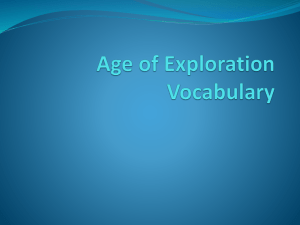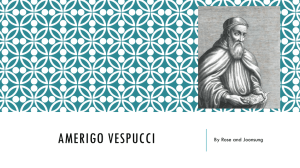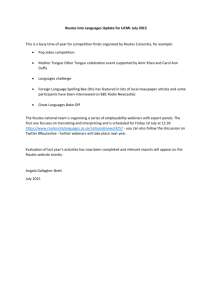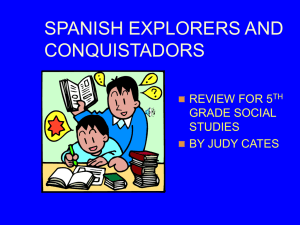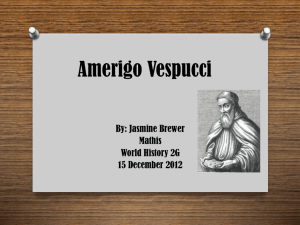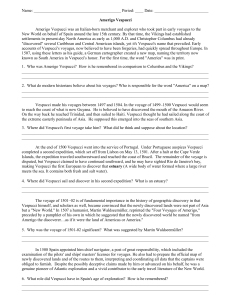Unit 2 Age of Exploration Lessons 1-4
advertisement
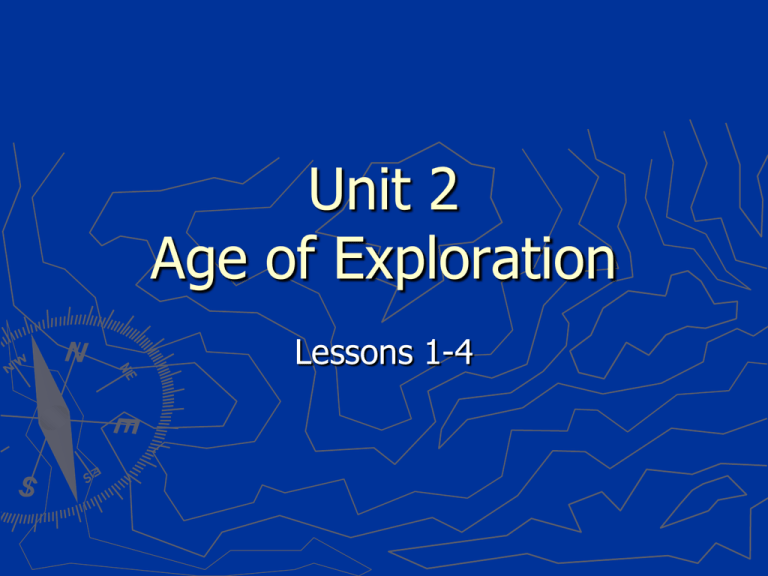
Unit 2 Age of Exploration Lessons 1-4 Vocabulary 1. A place to live that is set up in a new area A. emperor 2. The ruler of an empire B. longitude 3. A place where people meet to trade goods C. trading post 4. To change D. settlement 5. A distance east or west of the prime meridian, usually measured in degrees E. reform F. astrolabe 6. A tool that shows which direction is north G. compass 7. A tool that helped sailors use the sun and stars to find their location 8. A river that flows into a larger river or lake A. convert 9. A long and carefully organized trip B. expedition 10. A science used by sailors to find their place and plan their route C. tributary D. slavery 11. A person who makes maps or charts E. cartographer 12. The practice of owning people and forcing them to work without pay 13. A distance north or south of the equator, usually measured in degrees 14. To change someone’s or one’s own beliefs F. navigation G. latitude 15. A person who starts a new business A. charter 16. The act of sailing around something B. circumnavigation 17. An official document from an authority to do something C. entrepreneur D. mission 18. An area or place that is ruled by a distant country 19. A place set up by a religious group to teach religion and other ways of life to native people E. colony Marco Polo’s book caused A. B. C. D. more books on swimming games to be written more people to be interested in Asia him to become extremely wealthy war between Spain and Portugal New technology in the 1400’s A. B. C. D. made crossing the Northwest Passage possible helped Marco Polo with his expedition made travel by sea change lead to the Protestant Reformation Which of the following was NOT a goal of European exploration? A. B. C. D. finding new trade routes to Asia controlling new land establishing colonies ending the Reconquista Converting people to Catholicism was the goal of A. B. C. D. the American Indians the Reconquista the Counter Reformation Amerigo Vespucci Name two present-day cities founded by the Dutch (from the Netherlands). A. B. C. D. New Amsterdam and Fort Orange Boston and Albany New York City and Albany Buffalo and New York City Atlantic trade routes carried goods and Africa __, enslaved people between , and ____ Europe the Americas . Which countries claimed land in the Americas (click to find out)? Spain China Germany Russia Portugal France England Sweden Belgium The Netherlands Why did colonists often build settlements near the sea or along rivers? Colonists settled near bodies of water so that people they could move and supplies easier. Finding new trade routes were important to European leaders and early explorers for all of the reasons EXCEPT A. B. C. D. the current sea routes were risky flooding had destroyed all the crops thieves robbed merchants travel between Europe and Asia was costly and dangerous In 1540, Francisco Vasquez de Coronado explored Mexico looking for cities of gold. He never found them, but the area later A. B. C. D. was settled with missions was attacked by aliens was inhabited by tiny gremlins was populated with thousands of leprechauns Name two tools that improved sailing and explain why they were important. Two tools that improved sailing were the magnetic compass and the _________________ astrolabe magnetic compass _____________. The ________________ north shows which direction is ___________, and astrolabe the ____________ helped sailors use the sun and stars to find their location. Europeans now felt it was possible to search Asia for new sea routes to _________. What was the Northwest Passage? How did the search for the Northwest Passage and Magellan's circumnavigation of the globe change Europeans’ understanding of the world? water ________ route The Northwest Passage is a ________ North America through __________ ___________ that would Pacific Asia lead to the _________ Ocean and thus to _____. The Europeans now knew that the riches of Asia westward route. could be reached by way of a __________ How did the New World become known as America? Amerigo __________lead Vespucci __________ an expedition south of where Columbus had landed. A cartographer suggested naming this New ___________ World after Vespucci, so they called it America. Name the geographic areas that each of the following countries settled in the New World: Spain Present-day Central America South America France Eastern North America Portugal Eastern South America How did the Age of Exploration change the world? Mention at least ONE European Explorer and explain his role.
